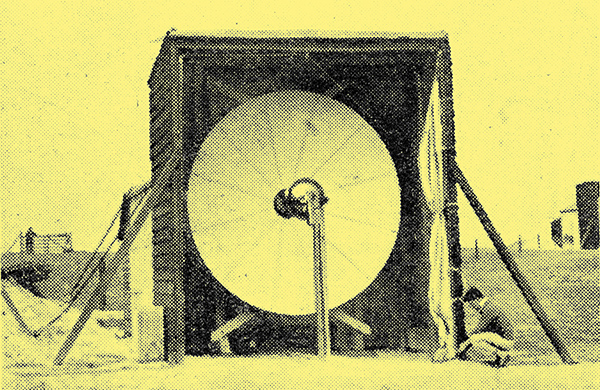|
Statements in the Daily Press recently have referred to Marconi's death ray and other sensations. In this interview with Our Special Correspondent, the Marchese explains what his views are on the uses of wireless in war-time with particular reference to his latest wonder - the micro-wave.

Marconi pointed out that although it was true that a heating effect was experienced near micro-wave transmitters, this only held good for a yard or so in front of the aerial. The aerial in this picture is the 18 cm apparatus used for cross-channel working.
The League of Nations and delegates at the Disarmament Conference must have read with horror and consternation a few weeks ago of the Marchese Marconi's predictions regarding death rays, wireless-controlled aeroplanes and other devilish instruments of war. Who will care for the prohibition of big guns, poison gas and so on if the great scientist can achieve all the things of which he talks.
Fortunately, the Marchese Marconi, when I interviewed him on this question of wireless in the next war assured me that he was speculating rather than predicting.
The Floating Laboratory
'I am not emphatic about anything in the science of wireless', he declared with a laugh. 'We know, that anything is possible and I should be the last to declare that even the death ray was impossible. So when I talk of death rays and radio bombs I am merely mentioning them as possibilities. Indeed, I don't think we are anywhere near the death ray yet'.
Here I questioned The Master Mind of Radio regarding the, experiments he has been carrying out during the winter months in his floating laboratory - the famous yacht Elettra. All the world knows by now that he is deep in investigations of the properties of wavelengths below one metre - microwaves he calls them.
'Isnt it a fact', I asked, 'that you experience a heating effect near your micro-wave transmitters?'
'Oh, yes', he replied 'Thats true, but only for a yard or so in front of the aerial. I suppose we might say that this is on the track of the death ray, but the power is very small - a mere thirty Watts or so. I think that sort of death ray is impracticable for a long while yet. We can't get the power, you see'.
Secret Talks at Sea
Why can't you get the power? I asked.
'The valves won't stand it', was the answer. 'I want two or three kilowatts in the micro-wave aerials, but the valves melt. We'll get the valves eventually, and I predict big things for micro-waves then. Already I have spoken one hundred and sixty-eight miles with wavelengths of about fifty centimetres, and I can see that micro-wave apparatus is going to be extremely useful for all sorts of things. Thus ships at sea, in a fleet, for instance, can talk to one another quite secretly because the micro-waves don't get out of hand like fifteen-metre transmissions do'.
'Why, the fifteen-metre transmissions astonished us by turning up in Australia when we only intended them to be heard a few miles! The micro-waves pass right through the Heaviside layers, so there is no risk of them being reflected back to the ears of the enemy. For trench warfare micro-wave sets are ideal. One-man micro-wave wireless sets are quite feasible, because the aerials are so small - just an inch or two long'.
Packets of Explosives
Then I, broached the subject of the 'Radio Bomb', which was suggested by Mr H G Wells in a recent broadcast when he spoke of packets of explosives being directed and landed so as to cause destruction in any desired part of the World.
'That is a question of wireless control', said Marconi, 'and I have already told you that aeroplanes and so on could be directed by wireless if necessary', he continued. 'Mr Wells is not far wrong in his prediction you see, because I imagine we could easily send a flying radio bomb and control it by wireless, landing it just where we wanted it. But if we tried to send it too far the enemy could get on to the same wavelength, turn the bomb back and use it to their own advantage. An amusing possibility but one which would have to be prepared for', he added with a smile.
Marconi told me a lot about his micro-waves. How he found them free of all interference, for instance; and what a treat it was to be away from all atmospherics. 'Even during a thunder storm' he said. 'I was able to listen with the headphones on, and when vivid flashes of lightning occurred I only heard a little click. The thunder caused me much more trouble than the electrical disturbance'.
He spoke of the possibilities of micro-waves for broadcasting. 'The steel frames of London's buildings might have an undesirable effect', he said. The same difficulty, it seems, might apply to police wireless. 'But there are a lot of things I want to try out', concluded the great scientist, 'and I shall be very busy in my laboratories for months to come before I can answer all your questions. I return to Italy at the end of June, and intend to start straight away again on my micro-wave researches. Perhaps next time I come to London I shall have something really interesting to tell you'. And by the manner in which he passed this last remark I gathered that he had something up his sleeve, if the truth be told.
|